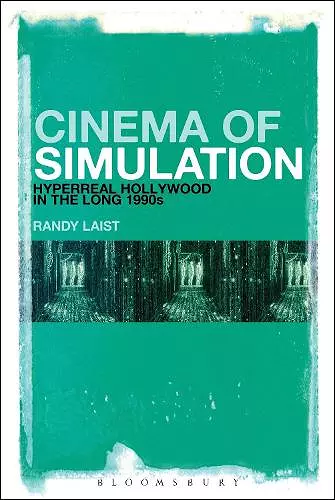Cinema of Simulation: Hyperreal Hollywood in the Long 1990s
Format:Hardback
Publisher:Bloomsbury Publishing PLC
Published:7th May '15
Currently unavailable, and unfortunately no date known when it will be back

Drawing on the critical theories of Jean Baudrillard, Cinema of Simulation performs close readings of key films to examine cinematic visions of mutational reality.
Hyperreality is an Alice-in-Wonderland dimension where copies have no originals, simulation is more real than reality, and living dreams undermine the barriers between imagination and objective experience. The most prominent philosopher of the hyperreal, Jean Baudrillard, formulated his concept of hyperreality throughout the 1980s, but it was not until the 1990s that the end of the Cold War, along with the proliferation of new reality-bending technologies, made hyperreality seem to come true. In the “lost decade” between the fall of the Berlin Wall and 9/11, the nature of reality itself became a source of uncertainty, a psychic condition that has been recognizably recorded by that seismograph of American consciousness, Hollywood cinema.
The auteur cinema of the 1970s aimed for gritty realism, and the most prominent feature of Reagan-era cinema was its fantastic unrealism. Clinton-era cinema, however, is characterized by a prevailing mood of hyperrealism, communicated in various ways by such benchmark films as JFK, Pulp Fiction, and The Matrix. The hyperreal cinema of the 1990s conceives of the movie screen as neither a window on a preexisting social reality (realism), nor as a wormhole into a fantastic dream-dimension (escapism), but as an arena in which images and reality exchange masks, blend into one another, and challenge the philosophical premises which differentiate them from one another. Cinema of Simulation: Hyperreal Hollywood in the Long 1990s provides a guided tour through the anxieties and fantasies, reciprocally social and cinematic, which characterize the surreal territory of the hyperreal.
Grounded in textual analysis, the book serves as an important guide to the philosophical reading of film ... [It] makes a very important contribution to the larger academic discourse on 1990s science fiction. * Historical Journal of Film, Radio and Television *
This analysis is impressively adept at situating the films of the long 1990's into their historical context, bookended as they are by the wish-fulfilling Reaganite cinema of the prior decade and the intrusion of the real in the wake of 9/11. Laist recasts both the 1980's and the beginning of the 21st century as he explores how hyperreality played through the decade in between. While Baudrillard is at the heart of his lens, Laist deploys and interrogates feminist, Marxist, historiographic, and Freudian perspectives along the way. All readers will appreciate his careful and entertaining attention to the details of the popular films he considers, making this a study that will engage fans, students, and film scholars alike. * Robin DeRosa, Professor of English, Plymouth State University, USA *
A fascinating exploration of the theme of hyperreality in popular cinema of the long '90s. Laist's detailed, accessible, and entertaining new book constitutes a major contribution to the field of film studies while providing a thrilling opportunity to revisit many of our favorite movies. * Michael Skinner, Assistant Professor of Theatre, Southern Connecticut State University, USA *
Randy Laist’s exemplary study on the long 1990s is remarkable for its fusion of postmodern critical theory and Hollywood cinema by exploring the contested terrain of the authentic and the artificial, new historicism and narrative mazes, at the fin-de-millennium. An indispensable and fascinating volume for anyone interested in American Culture and 1990s Hollywood Cinema. * Sorcha Ní Fhlainn, Lecturer in Film Studies and American Literature, Manchester Metropolitan University, UK *
This is an important, critically sophisticated, and extremely well written examination of our potential collective futures--or at least the ones Hollywood is willing to tell us about. * Scott Bradfield, Retired Professor of American Literature and Creative Writing, University of Connecticut, USA, and author of The People Who Watched Her Pass By *
ISBN: 9781628920796
Dimensions: unknown
Weight: 536g
272 pages